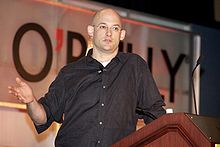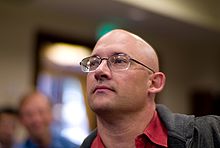- Clay Shirky
-
Clay Shirky 
Clay Shirky at the 2006 O'Reilly Emerging Technology ConferenceBorn 1964 (age 46–47)
Columbia, MissouriOccupation Writer, consultant, lecturer[1] Known for Writing Clay Shirky (born 1964[2]) is an American writer, consultant and teacher on the social and economic effects of Internet technologies. He has a joint appointment at New York University (NYU) as a Distinguished Writer in Residence at the Arthur L. Carter Journalism Institute and Assistant Arts Professor in the New Media focused graduate Interactive Telecommunications Program (ITP).[3] His courses address, among other things, the interrelated effects of the topology of social networks and technological networks, how our networks shape culture and vice-versa.[4]
He has written and been interviewed extensively about the Internet since 1996. His columns and writings have appeared in Business 2.0, the New York Times, the Wall Street Journal, the Harvard Business Review and Wired.
Shirky divides his time between consulting, teaching, and writing on the social and economic effects of Internet technologies. His consulting practice is focused on the rise of decentralized technologies such as peer-to-peer, web services, and wireless networks that provide alternatives to the wired client–server infrastructure that characterizes the World Wide Web.
In The Long Tail, Chris Anderson calls Shirky "a prominent thinker on the social and economic effects of Internet technologies."[5]
Contents
Education and career
After graduating from Yale University with a Bachelor of Arts degree in fine art in 1986, he moved to New York.[6] In the 1990s he founded the Hard Place Theater, a theatre company that produced non-fiction theater using only found materials such as government documents, transcripts and cultural records.[6] and also worked as a lighting designer for other theater and dance companies, including the Wooster Group, Elevator Repair Service and Dana Reitz.[7] During this time, Shirky was vice-president of the New York chapter of the Electronic Frontier Foundation, and wrote technology guides for Ziff Davis. He appeared as an expert witness on cyberculture in Shea v. Reno, a case cited in the U. S. Supreme Court's decision to strike down the Communications Decency Act in 1996.
Shirky was the first Professor of New Media in the Media Studies department at Hunter College, where he was key in developing the MFA in Integrated Media Arts program.
In the fall of 2010, Shirky was as a visiting Morrow Lecturer at Harvard University's John F. Kennedy School of Government[8] instructing a course titled: "New Media and Public Action".[9]
Views
In his book Here Comes Everybody Shirky explains how he has long spoken in favor of crowdsourcing and collaborative efforts online. He uses the phrase "the Internet runs on love" to describe the nature of such collaborations.[10] In the book, he discusses the ways in which the action of a group adds up to something more than just aggregated individual action.
He points to four key steps. The first is sharing, a sort of “me-first collaboration” in which the social effects are aggregated after the fact; people share links, URLs, tags, and eventually come together around a type. This type of sharing is a reverse of the so-called old order of sharing, where participants congregate first and then share (examples include Flickr, and Delicious). The second is conversation, that is, the synchronization of people with each other and the coming together to learn more about something and to get better at it. The third is collaboration, in which a group forms under the purpose of some common effort. It requires a division of labor, and teamwork. It can often be characterized by people wanting to fix a market failure, and is motivated by increasing accessibility.
The fourth and final step is collective action, which Shirky says is “mainly still in the future.” The key point about collective action is that the fate of the group as a whole becomes important. In a presentation called "Gin, Television, and Social Surplus",[11] Shirky popularized the concept of cognitive surplus, the time freed from watching television which can be enormously productive when applied to other social endeavors. He also notes that we are experiencing an era where people like to produce and share just as much, if not more than they like to consume. Since technology has made the producing and sharing possible, he argues that we will see a new era of participation that will lead to big change.
Shirky has also written about "algorithmic authority," which describes the process through which unverified information is vetted for its trustworthiness through multiple sources.[12]
The Shirky Principle
In April, 2010, Kevin Kelly cited the phrase "Institutions will try to preserve the problem to which they are the solution," and called it the "Shirky Principle", as the phrasing reminded him of the clarity of the Peter Principle.[13][14][15]
Response to Evgeny Morozov
In March 2011, Shirky responded to questions raised by Evgeny Morozov about consulting he had done for the Libyan government. Shirky explained that he had been invited in 2007 to speak in Boston to Libya's IT Minister.[16] Shirky stated that the talk was "about using social software to improve citizen engagement in coastal towns. The idea was that those cities would be more economically successful if local policies related to the tourist trade were designed by the locals themselves." Shirky added that nothing came of the project beyond his initial talk. He defended his underlying desire to expand representative government in Libya and concluded that "the best reason to believe that social media can aid citizens in their struggle to make government more responsive is that both citizens and governments believe that."
Bibliography
- The Internet by E-Mail (1994) - ISBN 1-56276-240-0
- Voices from the Net (1995) - ISBN 1-56276-303-2
- P2P Networking Overview (2001) - ISBN 0-596-00185-1
- Planning for Web Services: Obstacles and Opportunities (2003) - ISBN 0-596-00364-1
- Selected Articles in The Best Software Writing I, Joel Spolsky ed. (2005) - ISBN 1-59059-500-9
- A Group is its Own Worst Enemy by Clay Shirky
- Group as User: Flaming and the Design of Social Software by Clay Shirky
- Here Comes Everybody: The Power of Organizing Without Organizations (2008) - ISBN 978-1594201530
- Cognitive Surplus: Creativity and Generosity in a Connected Age (2010) - ISBN 978-1594202537
See also
Footnotes
- ^ "Shirky: Tisch School of the Arts at NYU". About.tisch.nyu.edu. http://about.tisch.nyu.edu/object/ShirkyC.html. Retrieved 2011-06-03.
- ^ "Clay Shirky of New York, New York, USA". PeekYou. 2008-04-27. http://www.peekyou.com/USA/New_York/New_York/Clay_Shirky/3121. Retrieved 2011-06-03.
- ^ "New Media Expert Clay Shirky to Become Professor at NYU’s Carter Journalism Institute, Tisch School of the Arts". Nyu.edu. http://www.nyu.edu/about/news-publications/news/2010/12/07/new-media-expert-clay-shirky-to-become-professor-at-nyus-carter-journalism-institute-tisch-school-of-the-arts.html. Retrieved 2011-06-03.
- ^ Bio from his official website[dead link]
- ^ Anderson, Chris (2008). The Long Tail. Hyperion. ISBN 9781401309664. http://books.google.com/?id=O2k0K1w_bJIC&pg=PA158&dq=Clay+shirky.
- ^ a b "Clay Shirky's Resume". Internet Archive Wayback Machine. Archived from the original on 1999-04-21. http://web.archive.org/web/19990421123028/www.shirky.com/Frames/cv.html. Retrieved 2010-08-21.
- ^ "Clay Shirky, Creative Advisor + Technology Consultant". Location One. http://www.location1.org/clay-shirky/. Retrieved 2010-08-21.
- ^ "Harvard Kennedy School - Clay Shirky". Hks.harvard.edu. http://www.hks.harvard.edu/about/faculty-staff-directory/clay-shirky/. Retrieved 2011-06-03.
- ^ "Harvard Kennedy School - New Media and Public Action". Hks.harvard.edu. http://www.hks.harvard.edu/degrees/teaching-courses/course-listing/dpi-680. Retrieved 2011-06-03.
- ^ The Internet Runs on Love: Here Comes Everybody, SuperNova Talk
- ^ "Gin, Television, and Social Surplus". Archived from the original on 2010-10-16. http://replay.web.archive.org/20101016111844/http://www.herecomeseverybody.org//2008//04//looking-for-the-mouse.html. Retrieved 20 January 2011.
- ^ * "Viewsflow blog", Viewsflow
- ^ Kevin Kelly (2010-04-02). "The Shirky Principle". The Technium. http://www.kk.org/thetechnium/archives/2010/04/the_shirky_prin.php. Retrieved 2010-04-09.
- ^ Mike Masnick (2010-04-09). "Institutions Will Seek To Preserve The Problem For Which They Are The Solution". Techdirt. http://www.techdirt.com/articles/20100404/2112388868.shtml. Retrieved 2010-04-09.
- ^ James Grimmelmann (2010-04-09). "The Shirky Principle". PrawfsBlawg. http://prawfsblawg.blogs.com/prawfsblawg/2010/04/the-shirky-principle.html. Retrieved 2010-04-09.
- ^ Clay Shirky (2011-03-01). "Consulting with Libya in 2007". Clay Shirky. http://www.shirky.com/weblog/2011/03/consulting-with-libya-in-2007/. Retrieved 2011-03-25.
References
- Shirky, Clay (2003). "Power Laws, Weblogs, and Inequality". Writings About the Internet. http://shirky.com/writings/powerlaw_weblog.html. Retrieved 2006-02-16.
- MacLeod, Hugh (2006). "Shirky's Law: "Equality. Fairness. Opportunity. Pick Two."". gapingvoid. http://www.gapingvoid.com/Moveable_Type/archives/002238.html. Retrieved 2006-02-16.
- Clay Shirky's Bio
- Gillette, Felix (2010-06-08). "Feats of Clay". The New York Observer. http://www.observer.com/2010/media/feats-clay. Retrieved 2010-06-09.
External links
- Clay Shirky's homepage
- Clay Shirky on Twitter
- Clay Shirky’s writings on the O'Reilly Network
- Profile and videos at TED.com
- Profile and talks at Fora.tv
- Socially Intelligent Computing A Dialogue with Daniel Goleman
- Ontology is Overrated: Links, Tags, and Post-hoc Metadata - a presentation (mp3) from the O'Reilly Emerging Technology Conference held in San Diego, California, March 14–17, 2005.
- Futures of the Internet (Flash,mp4,RealVideo,3gp,mp3). Internet Society - NY Chapter. 2008-04-16. http://www.isoc-ny.org/?p=214. Retrieved 2008-04-27. - Colloquium @ NYU.
- Clay Shirky at Web 2.0 Expo SF 2008
- "It's Not Information Overload. It's Filter Failure." Video, Clay Shirky at Web 2.0 Expo NY, Sept. 16-19, 2008.
- Video (and audio) of interview/discussion with Clay Shirky by Will Wilkinson on Bloggingheads.tv
- Let a Thousand Flowers Bloom A talk about journalism and pay walls.
Categories:- American technology writers
- 1964 births
- Living people
- New York University faculty
- Internet culture
- Technology evangelists
- Wikimedia Foundation Advisory Board members
- Yale University alumni
- Web 2.0
Wikimedia Foundation. 2010.

